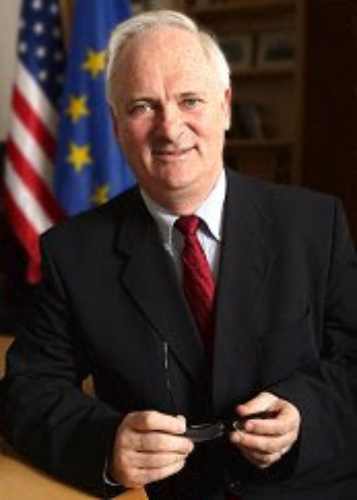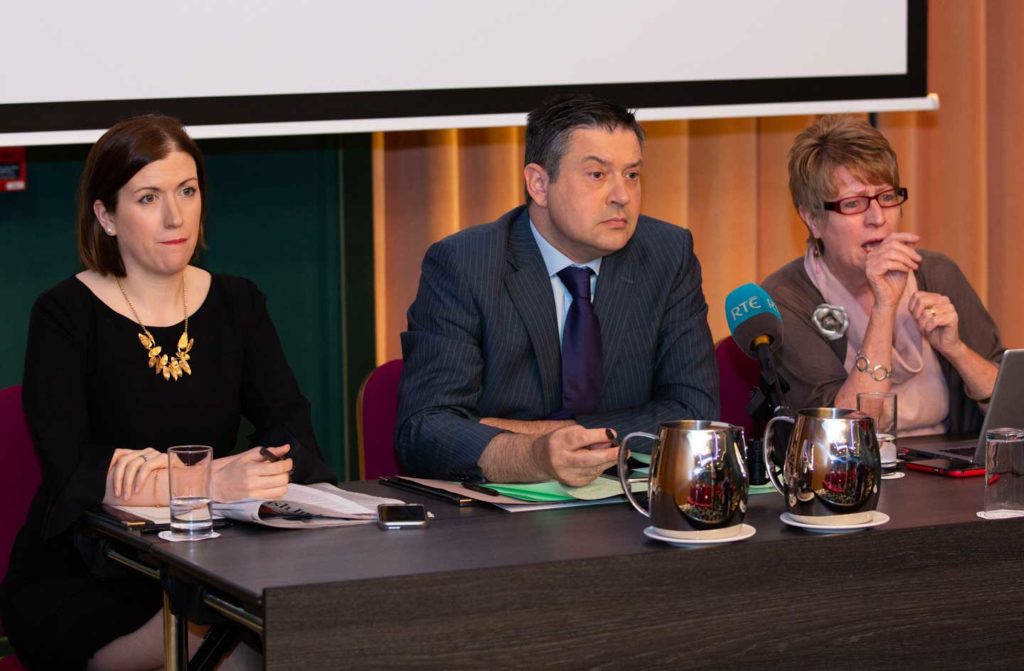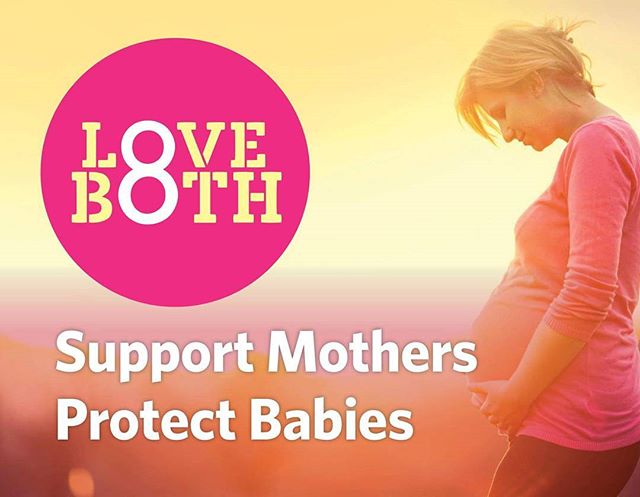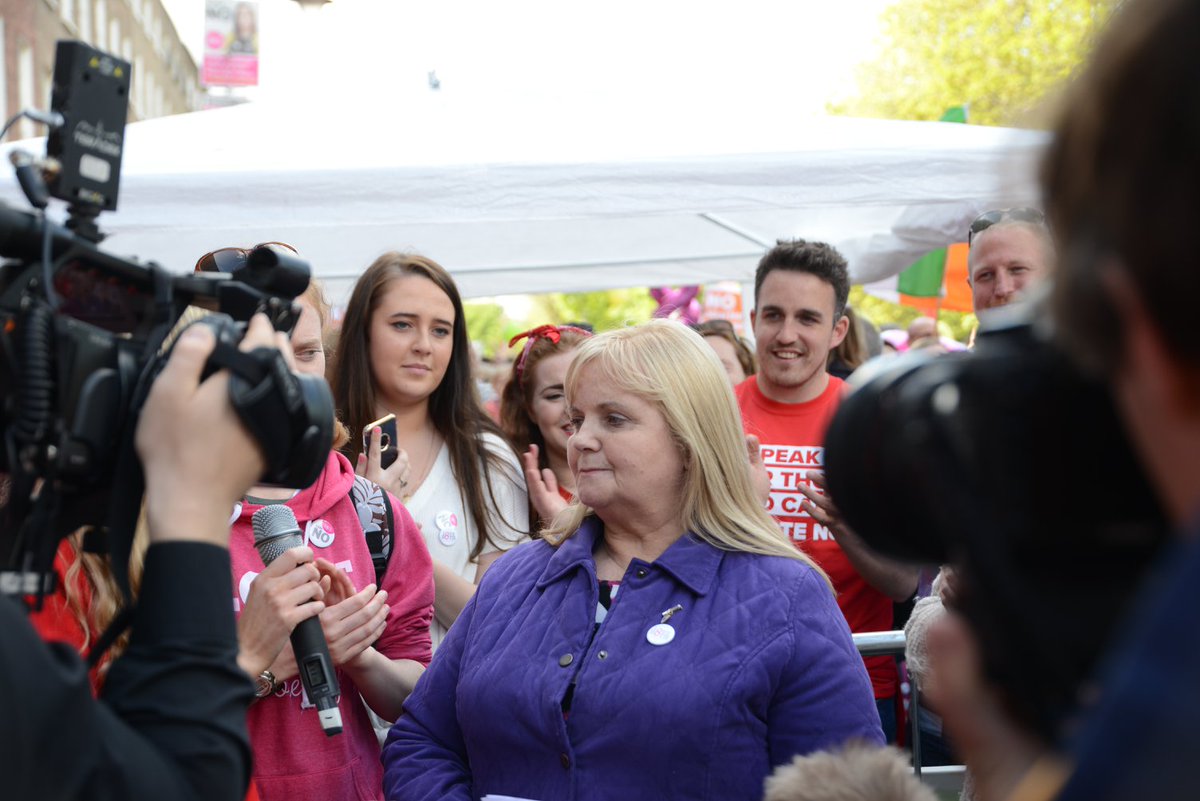
Former Taoiseach and leader of Fine Gael, John Bruton, has urged people to vote ‘No’ in the upcoming referendum on the Eighth amendment.
Speaking on RTÉ’s Today with Sean O’Rourke, Mr Bruton said he trusts the Irish people to uphold human rights and to be recognise that there are two lives involved. He said the Government was going too far to allow abortion without restriction up to 12 weeks and on the grounds of mental health up to six months. “That is the ending of a little Irish life, a little Irish boy or girl.” While Mr Bruton favours retaining the Eighth amendment in its entirety, he said the Government had other options and could have gone for a more restrictive regime. “I cannot understand why they came up with something so liberal.”
He said lives were being saved because abortion was not available in Ireland. People who might have contemplated abortion but did not have one were then happy to keep their baby when they saw it.
On the issue of pregnancy as a result of rape, Mr Bruton spoke of recovery from a trauma, and said “traumatising somebody is awful, but it’s not as final as killing somebody”.
In relation to babies with life-limiting conditions, Mr Bruton said that mistakes can be made, adding: “We should be cautious … when in doubt opt for life”.
Having a law that gives protection to the unborn in the Constitution is entirely consistent with the general philosophy of the Irish people, he said. “I want to ensure that a baby has the freedom to live, and has the freedom to make choices in its own life having been born, because a baby whose life is cut off before it’s born isn’t free to choose anything”.

A leading group of psychiatrists has said the use of the language of “healthcare” by those pressing for repeal of the 8th amendment is “fundamentally misleading.” In an open letter published on Wednesday, 26 consultant psychiatrists say the vast majority of abortions under the Government’s plan would involve healthy babies and healthy women: “This is not ‘healthcare’ but something else entirely”.
They point out that 90% of abortions will likely occur in the first 12 weeks of pregnancy, when the law does not require any kind of health ground. After 12 weeks, the proposed law “will conform closely to the law in the UK”, where a physical or mental health ground must be offered as a justification for abortion.
“As consultant psychiatrists, it is the so-called ‘mental health’ ground that particularly concerns us because we know from official UK statistics that 97pc of the almost 200,000 abortions which occur annually in the UK, take place under the ‘mental health’ ground”. In fact, they write, these abortions are almost always for socio-economic reasons, something which the Oireachtas Committee on abortion admitted in its report published last December.
“To use ‘health’ as a justification for abortion, when the vast majority of abortions do not take place on any kind of health ground, inverts the true purpose of medicine and doctors who value their calling should have nothing to do with this. Our Minister for Health, for his part, must defend the true purpose of medicine.”

Tens of thousands of people attended the ‘Love Both’ rally in Dublin Saturday, the last of six regional rallies which took place around the country in recent weeks. According to a spokesperson, the focus of Saturday’s event was the extreme nature of the Government’s abortion proposal and the fact that a Yes vote would inevitably open the door to abortion on demand.
Speaking to the crowd in Merrion Square, Caroline Simons, legal adviser to the Love Both campaign said If the 8th Amendment is repealed, Ireland will go from being a country that protects unborn human life to one of the most extreme abortion regimes in the world. “Let us be very clear, the Government’s proposal is not about abortion in ‘hard cases’, it is about introducing abortion on demand. That’s the stark, sad reality of the proposal brought forward by Health Minister Simon Harris. It is even more frightening than England’s abortion law, where 1 in every 5 babies loses his or her life to abortion”.
She continued: “Simon Harris’s proposal defines abortion as a ‘procedure intended to end the life of the foetus.’ The intent couldn’t be clearer. There is no mention in the proposal of making every reasonable effort to save the life of the baby when carrying out the procedure. The goal is to end a life, not save one. It has nothing whatsoever to do with healthcare.”
Many others addressed the crowd including doctors, parents of babies with life-limiting conditions, women who endured unexpected pregnancies and kept their babies and young people who owe their lives to the existence of the Eighth Amendment. One of those, a young Dublin student, Gavin Boyne, who was almost aborted, told the gathering: “I speak on behalf of all of those Irish men and women who are alive today because of your efforts – to make Ireland a better and more inclusive society where respect for one another starts in the womb.
“On the 6th of May, Dr Peter Boylan launched the Together for Yes national campaign – in Athlone. He described the 8th Amendment as a ‘failed experiment’, and in doing so, has personally attacked – every single person – who is alive today as a result of the 8th Amendment. I – am one of those people.
“I think people like Peter Boylan need to be very careful when they make comments like that and they need to realise the impact their words can have on people who are alive today because of the 8th amendment”.

The mother of the late Cranberries singer, Dolores O’ Riordan, has spoken out at the ‘Love Both Vote No’ rally in Dublin on Saturday where tens of thousands gathered in Merrion Square to speak up for unborn children and call for a ‘no’ vote in the upcoming abortion referendum.
Among the people talking at the rally was Eileen O’Riordan who travelled up from Limerick to attend the event. Addressing the crowd, she said: “My daughter Dolores . . . She was completely opposed to abortion. All our family will be voting no on the 25th of May.”
Dolores’ pro-life convictions were well known. Speaking to Rolling Stone magazine in 1995, she said: “I’m in no position to judge other women, you know? But, I mean, . . . It’s not good for women to go through the procedure and have something living sucked out of your bodies. It belittles women — even though some women say, ‘Oh, I don’t mind to have one.’ Every time a woman has an abortion, it just crushes her self-esteem, smaller and smaller and smaller.”

A group of early 200 lawyers has confirmed that, if the Eighth Amendment is repealed, the Government’s planned legislation would allow abortion on request up to six months. The lawyers, including former Judge of the European Court Aindreas O’Caoimh and former Chairman of the Referendum Commission, Iarfhlaith O’Neill, dismissed any contrary interpretation as having “no rational basis.”
In a prepared statement, the group compared the legislation which the Government proposed and that which was put in place in Great Britain in 1967, and concluded that both permitted abortion on request, even where the unborn was healthy and close to the point of being able to live outside the womb. Comments made by prominent ‘Yes’ campaigners like Dr. Peter Boylan supported this analysis, the group said.
The lawyers also rejected comments by Fianna Fail leader Michael Martin which suggested the Government’s proposals were necessary to deal with the hard cases of rape, incest, and fatal foetal abnormality. “It was open to the Government to amend the article in the Constitution instead of repealing it and introduce legislation which solely addressed exceptional cases. Instead, they yielded to pressure from extremists who wanted to sweep away the rights of the unborn completely and introduce a wide-ranging right to abortion.”
One of the signatories, Venetia Taylor, BL, said that she would have voted ‘Yes’ had the proposals been limited to exceptional cases. Instead, she said, the only way to stop a “profound injustice” was to join her colleagues in urging a ‘No’ vote.
“Women deserve better than this”, she said. “Irish society deserves better than this. That is why I am voting ‘No’.”

A group of parents of children with disabilities has accused the Government of “actively colluding in the destruction of the most vulnerable” as proposed legislation to follow repeal of the Eighth Amendment would allow the abortion of children screened for disabilities. The claim was made after details emerged that screening for Downs syndrome is being carried out in Irish hospitals as early as 9 weeks gestation.
Speaking on behalf of Disability Voices for Life, spokesperson Michael O’Dowd commented, “Dr. Rhona Mahony and Dr. Peter Boylan have both openly agreed and stated that Irish babies diagnosed with Down syndrome prenatally are being aborted. This is a horrifying and deeply upsetting fact. The proposal that Simon Harris has put forward is discriminatory and regressive. Children like ours need support, and care, not the ending of their life”.
Mr.O’Dowd added, “The abortion campaigners are now being honest about how this abortion proposal discriminates against the most vulnerable. Now that the facts are out, Minister Harris should debate his abortion proposal.”
He continued: “The whole debate regarding the impact of the Abortion proposal has been characterised by misrepresentations, and downright lies. Too many people are either complicit or silent while the majority of those diagnosed with Trisomy-21 have their lives ended before they’re even born. Where are the high minded commitments to the Convention of Persons with Disabilities to promote, protect and ensure the full and equal enjoyment of all human rights, including that of the right to life, by all persons with disabilities? Instead we have the obscenity here in Ireland where an organisation, Inclusion Ireland, purporting to represent those people actually campaigns for a measure that will impact on them even further. A Minister for disabilities claims there is no evidence of this genocide and a Government of the people actively colludes in the destruction of the most vulnerable.”
“The only line in the sand is the Irish people who should Vote No on May 25th,” he concluded.

The business affairs correspondent for the Irish Times, Mark Paul, has lambasted Google for its decision to ban all 8th referendum ads calling it a terrifying “corporate intervention into Irish constitutional politics”.
“Does it not concern you,” he asked in a column in today’s newspaper, “that executives unknown, at a Californian-headquartered, New York-listed technology behemoth can take a sudden, seemingly arbitrary decision at the height of an Irish referendum campaign, potentially affecting the wording of Bunreacht na hÉireann? It terrifies me.”
He said the practical impact of Google’s decision “blatantly benefits one campaign side in a referendum at the expense of the other, is the very definition of foreign interference in our system.”
He said that the political editor of The Irish Times, Pat Leahy, had reported that Facebook and Google “became fearful in the past week that if the referendum was defeated, they would be the subject of an avalanche of blame” because No was more effectively using their platforms to target voters.
Addressing Yes campaigners directly, Mr Paul said: “Perhaps you do not care. You just want your side to win the vote and for the other shower to lose, and you’ll take any help you can get, even if it comes via a $754 billion, stock-market-listed US company. Brexiteers and Trump gained murky advantage through online. Revenge. The end justifies the means, you know? What will you do if, the next time a foreign corporate entity intervenes in a passionate Irish politic event, you are on the wrong side of the argument?”

All the main campaign groups to retain the Eighth Amendment united to issue a blanket condemnation of the decision by Google to ban all advertisements on the 8th referendum. The Pro Life Campaign, Save the Eighth group and the Iona Institute held a joint press conference yesterday where they said the move had nothing to do with preserving the integrity of the election, and everything to do with stopping the No side from winning. “It is very clear that the government, much of the establishment media, and corporate Ireland have determined that anything to secure a Yes vote must be done. In this case, it means preventing campaigns who have done nothing illegal from campaigning in a perfectly legal manner. This decision has been taken because one side in this referendum is afraid it is losing, and wants to prevent voters from being informed,” they said in a statement.
They said the campaign has been marked by attacks on every form of legitimate campaigning the NO side has taken part in, and a complete absence of scrutiny for the YES side. “Despite all of that, the polls have narrowed, and clearly there is fear in establishment Ireland that this referendum will be defeated. That explains the massive pressure exerted on Google, Facebook, and other platforms to deny advertising space to the NO campaign”. This, they said, was scandalous and “an attempt to rig the referendum”.
They concluded: “Online was the only platform available to the NO campaign to speak to voters directly. That platform is now being undermined in order to prevent the public from hearing the message of one side. This is completely unacceptable, and it brings the conduct of what had, heretofore, been a civil campaign into severe dispute”.
Earlier in the week, transparency campaigner, Gavin Sheridan, predicted the No side would win and would do so in part because of their large advantage in online advertising. He issued a clarion call to yes campaigners to increase their spending on those platforms massively to catch up. Instead, it seems, they simply applied pressure to the internet giants who very quickly buckled.

Five of Ireland’s most senior Obstetricians and Gynaecologists, including four former Chairmen of the Institute of Obstetricians and Gynaecologists, as well as the current Chairman of the HSE working group on maternal mortality, have said they are horrified by comments made by Drs Peter Boylan and Rhona Mahony in recent days.
In a letter provided to the Save the 8th campaign, Professor John Bonnar, Dr Eamon McGuinness, Dr James Clinch, Dr Conor Carr, and Dr Michael O’Hare call on Drs Boylan and O’Mahony to withdraw comments they made in a video for Together for Yes.
The letter states: “We are particularly appalled by the comments of Dr Rhona Mahony in the Together for Yes campaign video where she states ‘In Ireland today, we play medical roulette with women’s lives’, and those of Dr Peter Boylan in the same video where he claims the Eighth Amendment ‘makes it difficult for us to treat women with compassion and give them the proper care that they need’. These comments are simply not true and are nothing less than a serious misrepresentation of the Irish maternal health system. We call on them to withdraw these statements.”
The letter goes on to say that no doctor should be allowed to “use the 8th amendment as an excuse”.
Commenting on the letter, Save the 8th campaign chairwoman Niamh Ui Bhriain said: “This is a very significant intervention in the debate from five of Ireland’s most distinguished and senior obstetricians. They clearly rebut and reject the notion that Ireland is in any way unsafe for women, and they directly challenge some outrageous falsehoods told by those campaigning for a yes vote. When four former Chairmen of the Institute of Obstetricians and Gynaecologists are saying that the 8th amendment does not impact maternal health, voters should sit up and listen”.

More than half of pregnant women in the country’s three main maternity hospitals who are told their babies will be born with Down Syndrome are opting for abortion. The women have availed of prenatal tests between 9 and 13 weeks into the pregnancy, at the National Maternity Hospital in Holles Street, the Coombe Hospital and Rotunda Hospital.
The figures obtained by the Irish Independent come after the master of Holles Street, Dr Rhona Mahony, speaking on RTE Radio’s the News at One yesterday said half of women whose babies would be born with Down Syndrome chose not to continue with the pregnancy. “The screening test is 99pc predictive,” said Dr Mahony, referring to an initial screening test that can be applied at between nine and 12 weeks’ gestation. She added that about 1,000 women who attend Holles Street avail of it each year. “It looks like 50pc continue and not continue,” she said. If a screening test indicates a high probability of a condition such as Down’s or Edward’s syndrome, then a more invasive diagnostic test can be done to achieve 100% accuracy.
Speaking on Liveline subsequently, Dr Peter Boylan offered a clarification that it might take two weeks to receive the results of the screening test, and another three days to get the results of a diagnostic test, so it would be unlikely that a woman would receive a definitive diagnosis of downs before the 12 week unrestricted abortion cut off date in the Government’s proposed abortion legislation. However, he envisaged that medical screening could improve in the future and offer a result as early as seven weeks into a pregnancy. In that case, he said he would favour legislation to prevent abortion on the grounds of disability. Dr Boylan also said that the Government’s legislation would exclude disability as grounds for abortion after 12 weeks. However, this claim was disputed by numerous pro-life legal scholars who said no such exclusion is written into the heads of the bill published by Minister Simon Harris.